Unit8 Have you read treasure Island yet?SectionA Grammar focus 4a-4c 课件(33张PPT)
文档属性
| 名称 | Unit8 Have you read treasure Island yet?SectionA Grammar focus 4a-4c 课件(33张PPT) |  | |
| 格式 | ppt | ||
| 文件大小 | 1.1MB | ||
| 资源类型 | 教案 | ||
| 版本资源 | 人教新目标(Go for it)版 | ||
| 科目 | 英语 | ||
| 更新时间 | 2023-03-21 16:08:32 | ||
图片预览


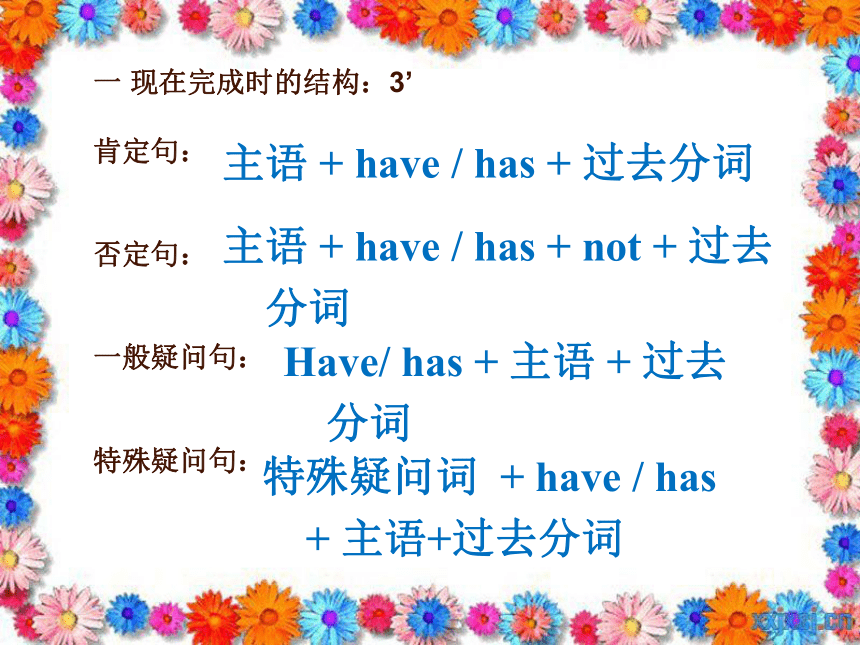
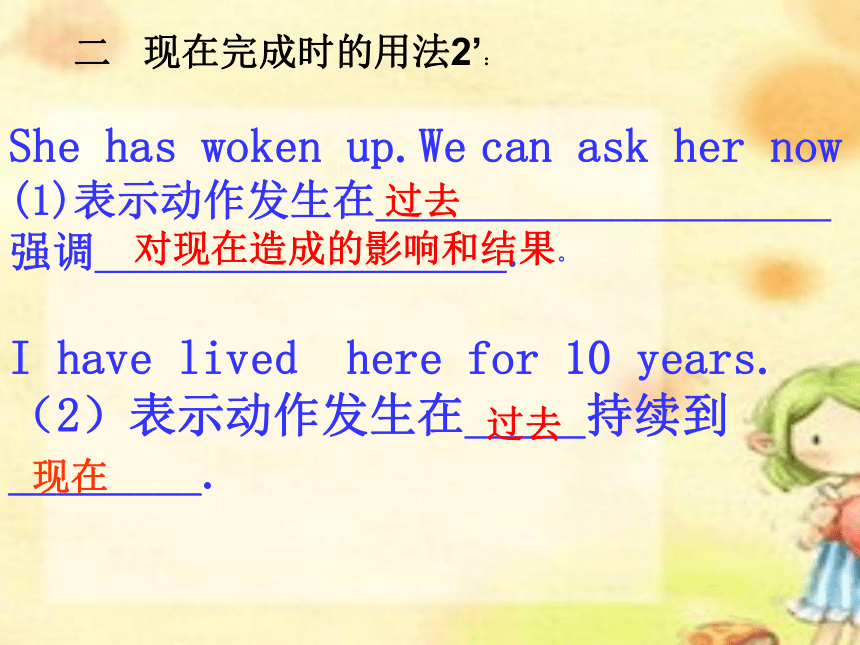
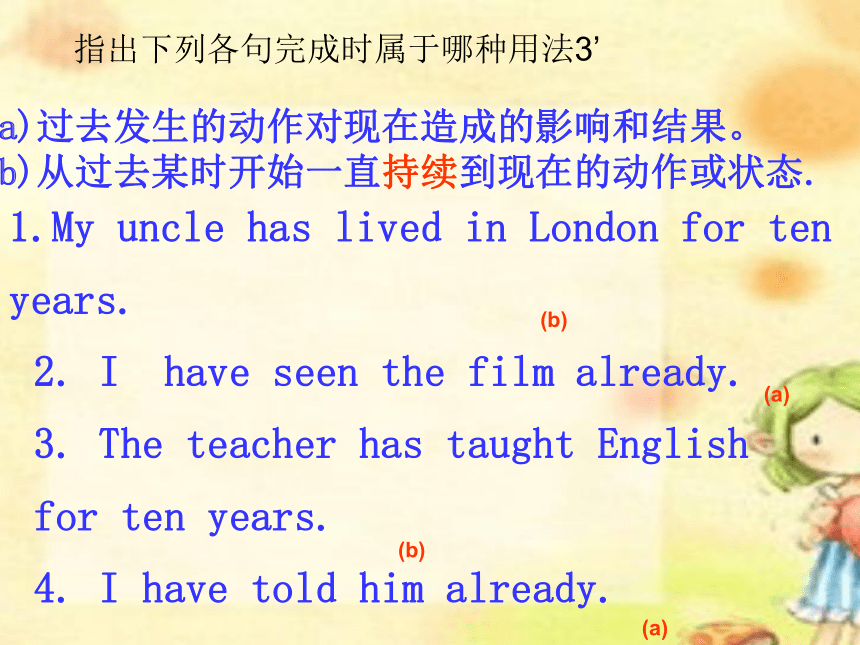
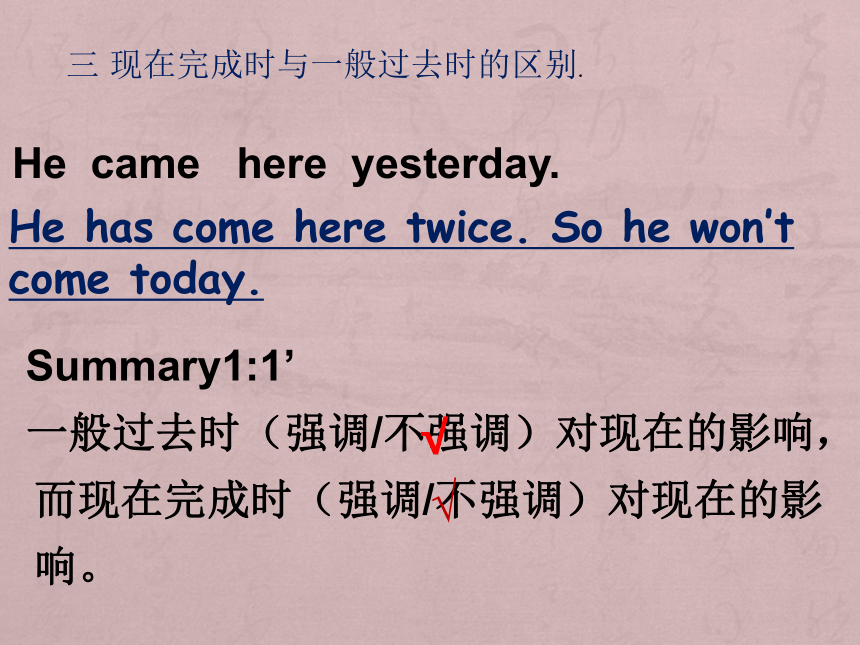

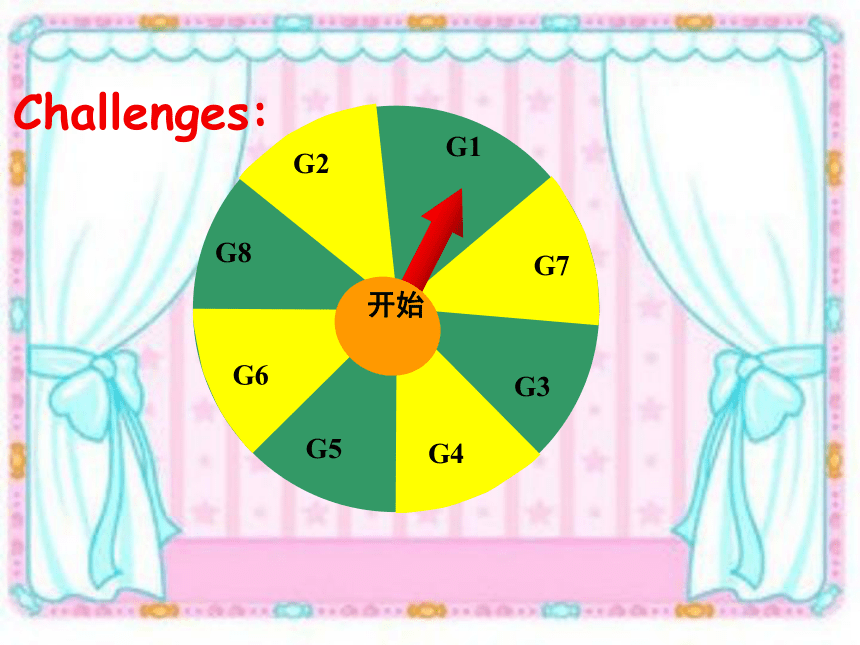
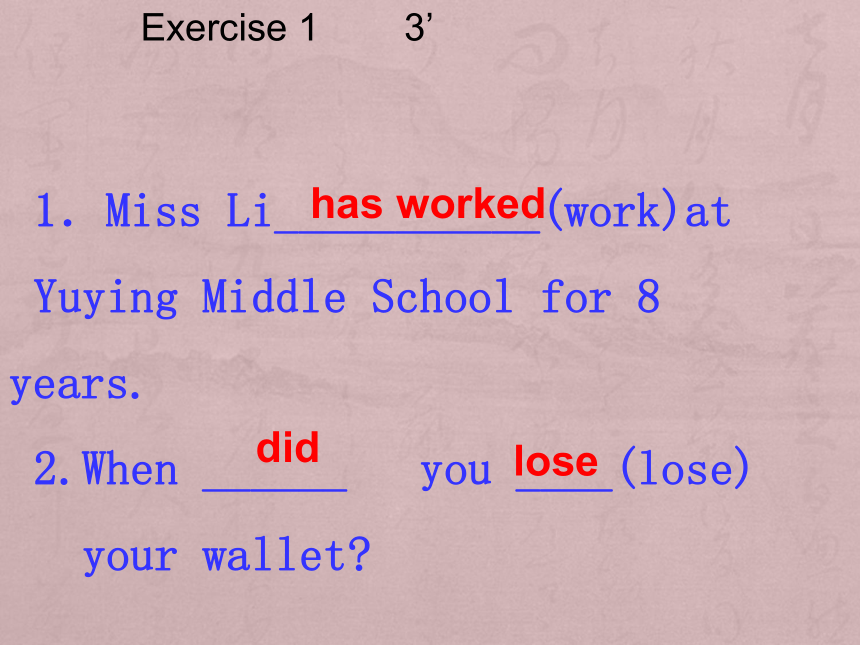
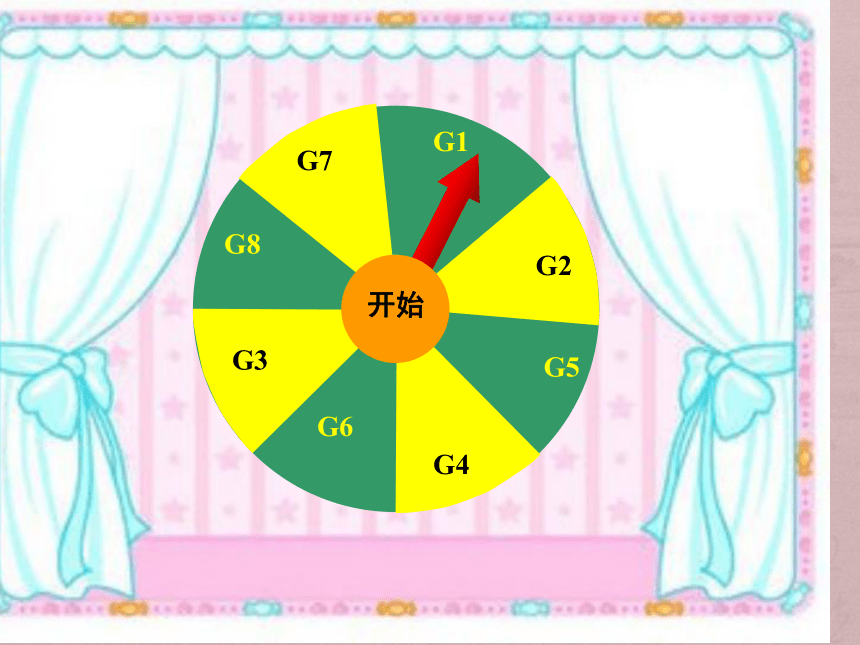
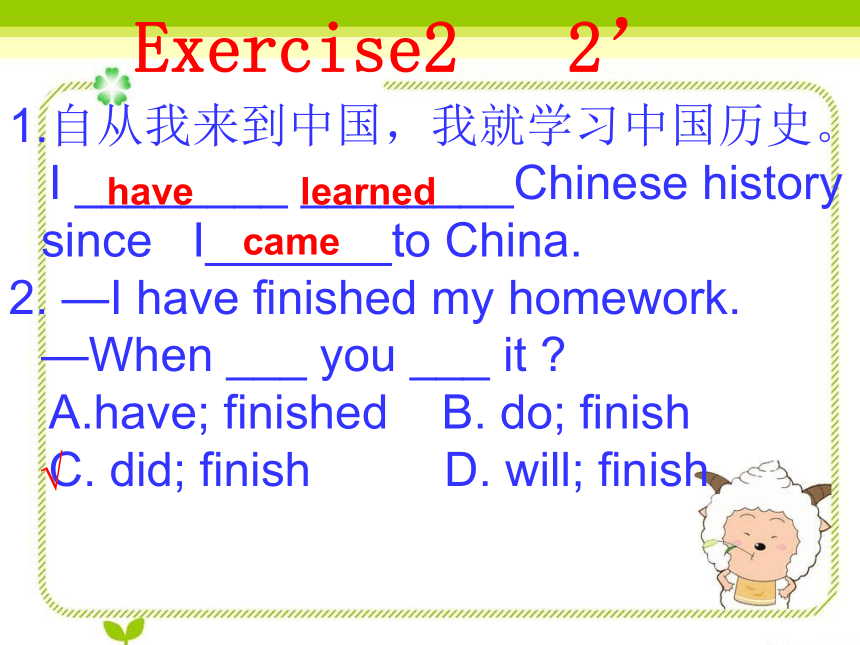
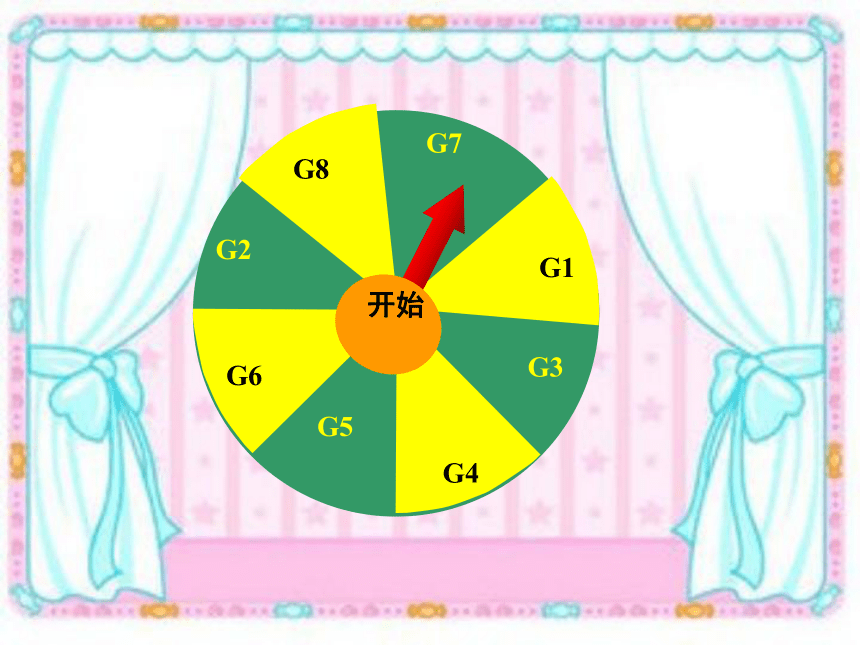
文档简介
(共33张PPT)
现在完成时
语法课
The present perfect tense
grammar
一 通过观察,总结现在完成时的结构
I have seen it before.
I have not finished my homework yet.
Have you met him
Where have you been
肯定句:
否定句:
一般疑问句:
特殊疑问句:
一 现在完成时的结构:3’
肯定句:
否定句:
一般疑问句:
特殊疑问句:
主语 + have / has + 过去分词
主语 + have / has + not + 过去
分词
Have/ has + 主语 + 过去
分词
特殊疑问词 + have / has
+ 主语+过去分词
She has woken up.We can ask her now .
(1)表示动作发生在_____________________
强调___________________.
I have lived here for 10 years.
(2)表示动作发生在_____持续到
________.
二 现在完成时的用法2’:
过去
现在
对现在造成的影响和结果。
过去
(a)过去发生的动作对现在造成的影响和结果。
(b)从过去某时开始一直持续到现在的动作或状态.
指出下列各句完成时属于哪种用法3’
My uncle has lived in London for ten years.
2. I have seen the film already.
3. The teacher has taught English
for ten years.
4. I have told him already.
(b)
(a)
(b)
(a)
Summary1:1’
一般过去时(强调/不强调)对现在的影响,而现在完成时(强调/不强调)对现在的影响。
√
He came here yesterday.
He has come here twice. So he won’t come today.
√
三 现在完成时与一般过去时的区别.
We haven't seen him since last year.
We didn't see him last year.
Liumei went the shop last night.
We have studied English for 10 years.
When did you lose your pen
I haven’t found him yet.
We have already cleaned the room.
I have ever been to three countries.
Summary 2:2 ’
现在完成时常与——————————
等词连用。
一般过去时常与————————————————
等词连用。
观察下列句子
since ,for, yet ,already,ever
last year等明确的过去时间及when
G1
G3
G4
G5
G6
G8
G2
开始
G7
Challenges:
1.Miss Li___________(work)at
Yuying Middle School for 8 years.
2.When ______ you ____(lose)
your wallet
Exercise 1 3’
has worked
did
lose
G1
G5
G4
G6
G3
G8
G7
开始
G2
1.自从我来到中国,我就学习中国历史。
I ________ ________Chinese history since I_______to China.
2. —I have finished my homework. —When ___ you ___ it
A.have; finished B. do; finish
C. did; finish D. will; finish
Exercise2 2’
have learned
came
√
G7
G3
G4
G5
G6
G2
G8
开始
G1
3’
G8
G6
G5
G4
G3
G2
G1
开始
G7
1.I have lived in Anyang _____10 years.
2.I have lived in Anyang _____2001.
3.I have lived in Anyang _____10 years ago.
Exercise3 2’
Fill in the blanks using “for” or “since”
for
since
since
四.延续性动词与瞬间性动词
延续性动词可以与表示时间段的状语连用。
非延续性动词在肯定句中与表示时间点的
状语连用.
指出下列时间是段时间还是点时间3’
Two days two days ago
10years 2minutes
Last night a whole day
In 1999 a year
延续性动词与瞬间性动词的转换.
Eg:I have borrowed this book for 5 days.
I—————— this book for 5 days .
F
T
have kept
leave --- be away,
borrow --- keep,
buy --- have,
begin/start --- be on,
die --- be dead,
finish --- be over,
join --- be in+组织机构,
be a member of+组织机构,
常见的转换
延续性动词与瞬间性动词的转换.
catch a cold --- have a cold,
come here --- be here,
go there --- be there,
become --- be,
come back --- be back,
fall asleep --- be asleep,
fall ill --- be ill,
go out →be out,
put on→ wear;
常见的转换
exercise1:火眼金睛 3‘.
The old man died for 4 years .
He joined the Party for 2 years .
I bought the book since 5 days ago.
———
———
——
has been dead
has been in
have had
3.Mary and Rose _______friends since
they met in 2000.
A. have made B. have been
C. made
4.The meeting _______ for a week now.
A. has finished
B. has ended
C. has been over
Exercise 2’
5.Miss Gao ______ this school for nearly 5
years.
A. has been in
B. has come to
C. has left
6. I ______ home for a week.
A. have returned
B. have been back
C. returned
Exercise 2’
五: have been to , have gone to
与 have been in
Summary 3’
have been to表示:——————————————
have gone to 则表示:————————————
have been in 表示:—————————————
My uncle has been to Beijing four times.
我叔叔去过北京四次了。
Mr. Yang has gone to Wuhan.He will be back soon
杨先生去了武汉,他马上回来。
Betty has been in London for two days.
贝蒂已经在伦敦两天了。
“曾经去过某地”(人已经回来);人的一种经历
去了某地”(人还没回来);
已在某地多长时间。”
GAME : BE CAREFUL
ALREADY
FOR
SINCE
YET
英语·新课标(RJ)
Ⅰ.用have/has gone(to),have/has been(to)或have/has been in填空
1 My cousin______________Beijing.I don't know when he'll come back.
2.They________________New York for two weeks.
has gone to
have been in
Exercise one 2’
英语·新课标(RJ)
Ⅰ.用have/has gone(to),have/has been(to)或have/has been in填空
1.Where is Tom
Maybe he _________ the teachers’ office .
2.Jim________never__________ Shanghai before.
Exercise two 2’
has gone to
has been to
I am so sorry,you have to minus 1 point now.
I am so sorry,you have to minus 2 points now.
Summary:
.
一. 现在完成时的结构 2’
.现在完成时的用法1’
三. 现在完成时与一般过去时的区别2’
四.延续性动词与瞬间性动词1’
五. have been to , have gone to
与 have been in 1’
( )
—Do you know the movie Lost in
Thailand
—Yes. I ______ it twice. It’s funny.
A. saw B. see C. have seen D. will see
C
( )
—Lunch
—No, thanks. I__________.
A. will eat B. am eating C. have eaten
( )
—Where is Tom We can’t find
him anywhere.
— Perhaps he _____ home.
A. has come B. is going
C. went D. was going
C
A
( )how long have you ___this book
A bought B borrowed
C had D lent
( )Where's Peter
He _______ to Nanjing.
A is going B has been
C has gone D.went
c
c
主语 谓语 状语
一般过去时 My homework finished yesterday
一般将来时 tommorrow
现在完成时 since you left
情态动词 …
一般现在时 everyday
Conclusion:被动语态的构成
is
was
will be
has been
should/could/must be
Thanks for listening!
现在完成时
语法课
The present perfect tense
grammar
一 通过观察,总结现在完成时的结构
I have seen it before.
I have not finished my homework yet.
Have you met him
Where have you been
肯定句:
否定句:
一般疑问句:
特殊疑问句:
一 现在完成时的结构:3’
肯定句:
否定句:
一般疑问句:
特殊疑问句:
主语 + have / has + 过去分词
主语 + have / has + not + 过去
分词
Have/ has + 主语 + 过去
分词
特殊疑问词 + have / has
+ 主语+过去分词
She has woken up.We can ask her now .
(1)表示动作发生在_____________________
强调___________________.
I have lived here for 10 years.
(2)表示动作发生在_____持续到
________.
二 现在完成时的用法2’:
过去
现在
对现在造成的影响和结果。
过去
(a)过去发生的动作对现在造成的影响和结果。
(b)从过去某时开始一直持续到现在的动作或状态.
指出下列各句完成时属于哪种用法3’
My uncle has lived in London for ten years.
2. I have seen the film already.
3. The teacher has taught English
for ten years.
4. I have told him already.
(b)
(a)
(b)
(a)
Summary1:1’
一般过去时(强调/不强调)对现在的影响,而现在完成时(强调/不强调)对现在的影响。
√
He came here yesterday.
He has come here twice. So he won’t come today.
√
三 现在完成时与一般过去时的区别.
We haven't seen him since last year.
We didn't see him last year.
Liumei went the shop last night.
We have studied English for 10 years.
When did you lose your pen
I haven’t found him yet.
We have already cleaned the room.
I have ever been to three countries.
Summary 2:2 ’
现在完成时常与——————————
等词连用。
一般过去时常与————————————————
等词连用。
观察下列句子
since ,for, yet ,already,ever
last year等明确的过去时间及when
G1
G3
G4
G5
G6
G8
G2
开始
G7
Challenges:
1.Miss Li___________(work)at
Yuying Middle School for 8 years.
2.When ______ you ____(lose)
your wallet
Exercise 1 3’
has worked
did
lose
G1
G5
G4
G6
G3
G8
G7
开始
G2
1.自从我来到中国,我就学习中国历史。
I ________ ________Chinese history since I_______to China.
2. —I have finished my homework. —When ___ you ___ it
A.have; finished B. do; finish
C. did; finish D. will; finish
Exercise2 2’
have learned
came
√
G7
G3
G4
G5
G6
G2
G8
开始
G1
3’
G8
G6
G5
G4
G3
G2
G1
开始
G7
1.I have lived in Anyang _____10 years.
2.I have lived in Anyang _____2001.
3.I have lived in Anyang _____10 years ago.
Exercise3 2’
Fill in the blanks using “for” or “since”
for
since
since
四.延续性动词与瞬间性动词
延续性动词可以与表示时间段的状语连用。
非延续性动词在肯定句中与表示时间点的
状语连用.
指出下列时间是段时间还是点时间3’
Two days two days ago
10years 2minutes
Last night a whole day
In 1999 a year
延续性动词与瞬间性动词的转换.
Eg:I have borrowed this book for 5 days.
I—————— this book for 5 days .
F
T
have kept
leave --- be away,
borrow --- keep,
buy --- have,
begin/start --- be on,
die --- be dead,
finish --- be over,
join --- be in+组织机构,
be a member of+组织机构,
常见的转换
延续性动词与瞬间性动词的转换.
catch a cold --- have a cold,
come here --- be here,
go there --- be there,
become --- be,
come back --- be back,
fall asleep --- be asleep,
fall ill --- be ill,
go out →be out,
put on→ wear;
常见的转换
exercise1:火眼金睛 3‘.
The old man died for 4 years .
He joined the Party for 2 years .
I bought the book since 5 days ago.
———
———
——
has been dead
has been in
have had
3.Mary and Rose _______friends since
they met in 2000.
A. have made B. have been
C. made
4.The meeting _______ for a week now.
A. has finished
B. has ended
C. has been over
Exercise 2’
5.Miss Gao ______ this school for nearly 5
years.
A. has been in
B. has come to
C. has left
6. I ______ home for a week.
A. have returned
B. have been back
C. returned
Exercise 2’
五: have been to , have gone to
与 have been in
Summary 3’
have been to表示:——————————————
have gone to 则表示:————————————
have been in 表示:—————————————
My uncle has been to Beijing four times.
我叔叔去过北京四次了。
Mr. Yang has gone to Wuhan.He will be back soon
杨先生去了武汉,他马上回来。
Betty has been in London for two days.
贝蒂已经在伦敦两天了。
“曾经去过某地”(人已经回来);人的一种经历
去了某地”(人还没回来);
已在某地多长时间。”
GAME : BE CAREFUL
ALREADY
FOR
SINCE
YET
英语·新课标(RJ)
Ⅰ.用have/has gone(to),have/has been(to)或have/has been in填空
1 My cousin______________Beijing.I don't know when he'll come back.
2.They________________New York for two weeks.
has gone to
have been in
Exercise one 2’
英语·新课标(RJ)
Ⅰ.用have/has gone(to),have/has been(to)或have/has been in填空
1.Where is Tom
Maybe he _________ the teachers’ office .
2.Jim________never__________ Shanghai before.
Exercise two 2’
has gone to
has been to
I am so sorry,you have to minus 1 point now.
I am so sorry,you have to minus 2 points now.
Summary:
.
一. 现在完成时的结构 2’
.现在完成时的用法1’
三. 现在完成时与一般过去时的区别2’
四.延续性动词与瞬间性动词1’
五. have been to , have gone to
与 have been in 1’
( )
—Do you know the movie Lost in
Thailand
—Yes. I ______ it twice. It’s funny.
A. saw B. see C. have seen D. will see
C
( )
—Lunch
—No, thanks. I__________.
A. will eat B. am eating C. have eaten
( )
—Where is Tom We can’t find
him anywhere.
— Perhaps he _____ home.
A. has come B. is going
C. went D. was going
C
A
( )how long have you ___this book
A bought B borrowed
C had D lent
( )Where's Peter
He _______ to Nanjing.
A is going B has been
C has gone D.went
c
c
主语 谓语 状语
一般过去时 My homework finished yesterday
一般将来时 tommorrow
现在完成时 since you left
情态动词 …
一般现在时 everyday
Conclusion:被动语态的构成
is
was
will be
has been
should/could/must be
Thanks for listening!
同课章节目录
- Unit 1 What's the matter?
- Section A
- Section B
- Unit 2 I'll help to clean up the city parks.
- Section A
- Section B
- Unit 3 Could you please clean your room?
- Section A
- Section B
- Unit 4 Why don't you talk to your parents?
- Section A
- Section B
- Unit 5 What were you doing when the rainstorm came
- Section A
- Section B
- Review of Units 1-5
- Unit 6 An old man tried to move the mountains.
- Section A
- Section B
- Unit 7 What's the highest mountain in the world?
- Section A
- Section B
- Unit 8 Have you read Treasure Island yet?
- Section A
- Section B
- Unit 9 Have you ever been to a museum?
- Section A
- Section B
- Unit 10 I've had this bike for three years.
- Section A
- Section B
